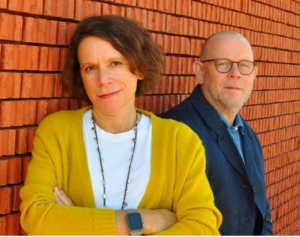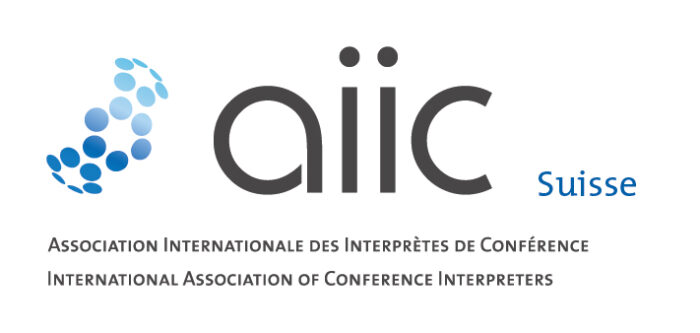Geneva, Casilda Regueiro and Jayne Magistris | 20.12.2020
Speakers: Inés Martín, Christophe Renfer and Agnès Perrot.
Panelists
Inés Martín is a member of AIIC and co-founder of interpreters.ch, Member of AIIC’s Consultant Interpreters Group (ex-Bizorg), based in Zurich
Christoph Renfer is a member of AIIC and co-founder of interpreters.ch, President of Calliope-Interpreters, Member of AIIC’s Consultant Interpreters Group, based in Basel
Agnès Perrot: AIIC Member, co-founder of Viva-Voce, former coordinator of the PriMS (Private Market Sector), former member of AIIC’s Consultant Interpreters Group, based in Martigny
Introduction given by Rawdha Cammoun-Clavería (Members’ Area)
PRESENTATION BY INÉS MARTÍN AND CHRISTOPH RENFER (Members’ Area)
Before Covid-19, RSI was in the air …

Some of the new platforms were present at the AIIC Prims meeting in London in January 2019 and it was a point on the agenda of the AIIC Swiss Region meeting in Bern in November 2019.
The general attitude then was skeptical and hostile. RSI was considered a threat but there was no immediate need to adapt.
During 2019 and early 2020 nobody talked about Zoom, Kudos, Interprefy, the new SIDP’s Simultaneous Interpretation Delivery Platforms.
We knew it was a threat because they had aggressive marketing, they were funded by venture capital, they were targeting AIIC interpreters.
The live tests had mixed results. There were many technical issues like sound quality and latency and confidentiality issues (now according to the speaker there are no sound quality and latency problems)
Covid-19 arrived
In March 2020, cancellations and postponements began, there was a shock in the market and with the lockdowns , the market died apart from a few exceptions.
Private market clients were generally accommodating, some honoured the contracts, some chose postponement versus cancellation and the damage was contained. Interpreters were generally calm, they didn’t panic, remained cooperative, flexible and were prepared to accept cuts if necessary.
Our settlement policy
We give clients one transparent contract in which we specify our fees as consultants, one only signature and one invoice. We make individual contracts with each interpreter who bill us and we negotiate with the client about payment for cancellations after agreeing terms with the interpreters.
When State Aid kicked in it was confusing at first, clients were less accommodating because there was this aid. There were different regimes in different cantons although on the whole it was efficient and not too bureaucratic. But the aid program ended on September the 15th.
The Pandemic brought about the rise of RSI in different modalities
- Video conferencing platforms like Teams, Google, Webex and Skype with no interpretation function and with workarounds needed
- Zoom with interpreting feature although no relay (possible with workarounds)Preferably interpreters should be co-located, it’s easy to use BUT provides no technical support and with security concerns so unacceptable for banks or insurance companies
- SIDPs like Kudo, Interprefy, Interactio, etc. RSI dedicated, suitable for relay, more versatile than platforms and Zoom, BUT very expensive for clients, financed by massive Venture Capital with different business models difficult to keep up with and they have their own roster of interpreters
- Hub which can be permanent or pop-up. Standard booths with hard consoles close to on-site meeting, with good technical support by equipment provider, can be combined with all technologies, very reliable but higher costs than standard RSI from home or office.
- Hybrid meetings with speakers and interpreters on-site, some speakers remotely, part of the audience may be on-site, standard booths with hard consoles, technical support by equipment provider, relay possible, can be combined with all technologies, longer lead time than RSI from home/office, reliable but higher cost than standard RSI.
Our experience is rich with pop-up hubs, with hybrid meetings, with Zoom collocated in office or home, and mostly bilingual meetings, but we have little experience with SIDPs.
Our key learnings are
- RSI is here to stay
- The trend is towards shorter meetings
- Market has gone completely virtual (Zoom, SIDP’s, Zoom, Hybrid)
- Clients are looking for advice and support
- This is an exciting time to strengthen client relationships
- Clients comply with Covid-19 protocols
- The emergence of new meeting formats is an opportunity
- We have higher cognitive load in RSI so we need to maintain or increase manning strength and cooperate with trusted equipment providers
- Not all interpreters are remote-ready
- Permanent learning and unlearning
- Interpreters can become more visible
- In the Swiss German market there is no pressure to reduce fees even for short meetings
- There is no pressure on professional addresses
- People are eager to meet again face to face
- Clients will want to use existing facilities
- On-site is less complex than RSI and not necessarily more costly
OUR COMMITMENT IS TO
- Get through the crisis without jeopardizing decades of achievements
- Shape a platform-neutral RSI market
- Protect AIIC working conditions
- Defend our professional address
- Avoid solo work in RSI even for meetings shorter than 45 min
- No pay by half-day/ hour/ minute!!!
- Ensure the livelihood of free lance interpreters
- No sell-out
- Prepare for Post-Covid era
A final thought :
Ultimately, every solution – on site or virtual – is only as good as the interpreters recruited and the technology is no more than the means for conveying the translated message
PRESENTATION BY AGNES PERROT (Members’ Area)

The fundamentals of recruiting stay the same before and after Covid 19, they depend on having a privileged relationship with clients. This relationship is even more important in times of Covid-19 because clients need a consultant they can rely on and they are used to receiving advice from us.
When in March 2020 Covid-19 was declared a heath emergency most meetings were cancelled or held with no interpretation since clients were not RSI ready.
It took time to recover. Some clients had their own platforms (Bluejeans, etc) for on-line meetings with no interpretation option. So Zoom emerged as the preferred platform. (Relay can be done by using two devices).
The downturn in work was 50 to 75% and after lockdown it was at a standstill. During the summer we did a lot of testing with our clients. Work picked up in September and right now it is ALL VIRTUAL although we still have no statistics.
Our faithful clients have not left us for Kudos or Interprefy which shows how important it is to have a relationship with the client. We are professional, flexible, ready to help them and make concessions while asking for our work conditions to be met. It is give and take.
But RSI poses a dilemma : we want to have good technical conditions BUT not so good that clients resort to RSI permanently.
Thanks to different time zones, we can hope that this will never happen!!!
RSI is more difficult, the cognitive load is much greater. Many colleagues are simply not ready. We’ve done a lot of training of colleagues.
FEES, are part of a customer’s education. It is better to have shorter meetings but not at a reduced price because the cognitive load is higher.
For 3 or more hour bilingual meetings: 2 interpreters, preferably 3, as clients NEVER stick to the schedule.
Hubs have the advantage of providing a technician.
Our sales arguments must convince the client to stay with us and not turn to Kudo or Interprefy. Some have had bad experiences and prefer to use their trusted interpreters.
About the Future: Concentrate on the clients you have. Make concessions but NOT in price!!! The professional address problem does not arise, apart from when interpreters have to travel to hubs in other cities.
If the Consultant Interpreter is not in the team it is important to have a trusted team leader.
In Conclusion: Consultant interpreters are doing the same as before but have to work !!
About whether we are GAMEKEEPERS turned POACHERS or POACHERS turned GAMEKEEPERS I would say we are GATEKEEPERS and must defend our position while helping clients in these difficult times.
TAKEAWAYS
- The role of the Consultant Interpreter is the same as during normal times, just harder since there is much more clarification/education to be provided
- The potential to uphold working and financial conditions depends on your clients and the relationship you have with your clients
- Expect more work in RSI mode than before the pandemic, but not 100%
- Clients want to meet in person again, but will have greater needs to make savings
- Zoom has emerged (so far) as the preferred RSI platform
- All the other platforms we tested with/without customers are sub-par and too complicated
CONCLUSION
Since Covid-19 struck, despite some major similarities (virtual/hybrid meetings are the norm, RSI is very present, meetings are on the whole shorter), the Swiss interpretation market seems to have been split in two, with German and French-speaking Switzerland facing very different situations.
Interpreters in German-speaking Switzerland, as presented by the three speakers, are adapting to the new norm of virtual meetings by educating clients, strengthening the client-interpreter relationship, and protecting interpreters’ financial conditions.
In French-speaking Switzerland, on the other hand, interpreters are having to contend with the relentless competition from foreign agencies, as well as SIDPs who, along with their technical solution, offer teams of interpreters at rates that are inconsistent with the Swiss cost of living. As a result, they are under pressure from clients to lower their rates, and provide more for less – with the threat that they could always find a cheaper solution elsewhere.
Why this stark difference? The most plausible explanation boils down to the very tool interpreters work with: the Swiss German market is protected by its language for which there is therefore very little competition abroad, contrary to the French-speaking market, centered around Geneva and its international organisations with their six languages for which competition is far greater.
Authors:


